A scream, not a celebration. Why Meduza broke its own rules to talk about exile, trauma, and self-censorship
Manage episode 483868546 series 3381925
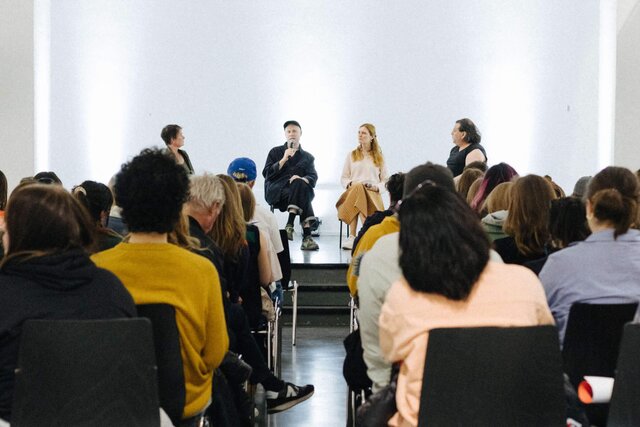
From April 26 to July 6, the Kunstraum Kreuzberg/Bethanien gallery in Berlin is hosting “No,” an exhibition curated and organized by Meduza. The project brings together artists and journalists in a series of installations and conversations to explore the experience of living and working in exile, as Russia wages a full-scale war in Ukraine and brutally suppresses dissent at home. The exhibition’s offline program launched with a discussion on censorship and self-censorship. Moderated by Gabriele Freitag, executive director of the German Association for East European Studies (which the Russian authorities have outlawed as an “extremist organization”), the panelists included Ukrainian writer Zhenia Berezhna, art researcher Teobaldo Lagos Preller, and Meduza editor-in-chief and exhibition co-curator Ivan Kolpakov. Meduza presents a transcript of their discussion, edited and abridged for length and clarity.
The “No” exhibition’s public events series is just getting started! On May 24, join us for the activation of Fernando Sánchez Castillo’s Expanded Memorial for Alexey Navalny, where you can meet the artist and take home a pocket-sized Navalny figurine in exchange for leaving a personal note on the theme of resilience. We’ll also be hosting another public talk and a Book Day meet-and-greet in June. You can see the full schedule and register for the events here.
Gabriele Freitag: Our topic tonight will be censorship and self-censorship, but before we delve in, let’s briefly talk about the exhibition itself. Ivan, what is the idea behind the “No” exhibition?
Ivan Kolpakov: Well, I think that the exhibition relates a lot to the topic of this discussion, and especially self-censorship. A couple of years ago, we realized Meduza was going to celebrate its 10-year anniversary. We actually never thought we were going to make it, but when we realized we had this celebration ahead, we felt uncomfortable — even wrong — talking about our experience.
On the one hand, we didn’t feel that we should be at the center of the story when we have a full-scale war in Ukraine, a real dictatorship in Russia, and our fellow journalists are in prison. But at the same time, it seemed wrong to avoid the topic of our own experience as an exiled media outlet and as a part of the Russian community in emigration. So, the fact that we were avoiding this conversation kind of pushed us to start it. Meduza is famous for its unique and very diverse storytelling, but we’d never curated an exhibition before. So, we decided to try, thinking maybe it would unlock the right tone for talking about things like exile or fear or polarization through the prism of Meduza’s experience. It’s very hard as journalists to tell your story because you shouldn’t be at the center of the narrative, so this became a kind of workaround for our self-censorship.
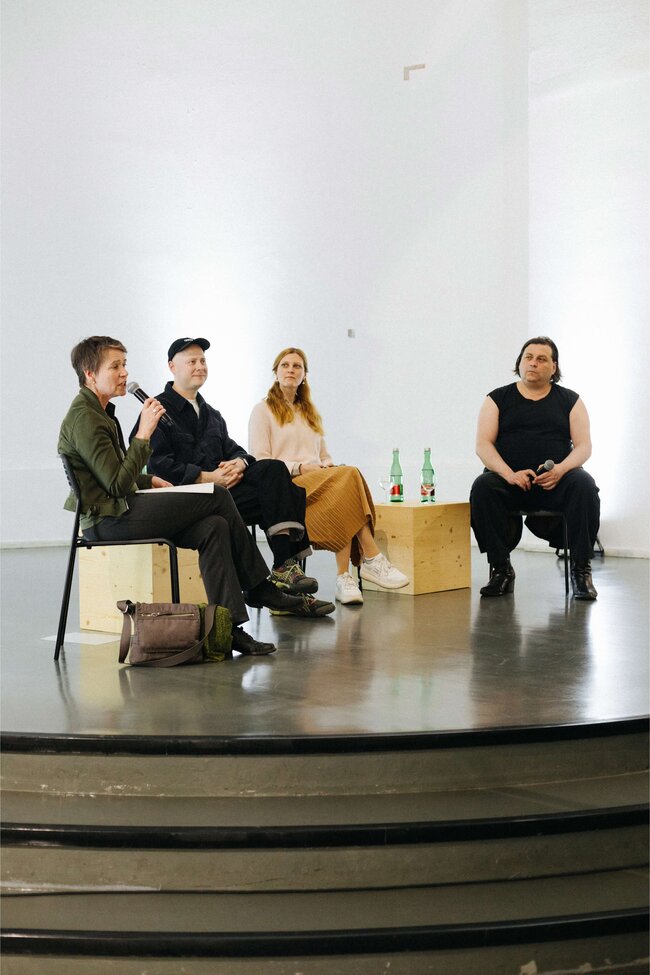

Gabriele Freitag: Let’s briefly talk about this word, “no.” It has a very basic meaning that you find in nearly every language, but still, it takes many shapes. Teobaldo, what does the word “no” mean to you, coming from Chile?
Teobaldo Lagos Preller: Chile was under a repressive regime of surveillance and human rights violations between 1973 and 1990, under General Augusto Pinochet. Back at the beginning of the ‘80s, people were getting used to certain forms of violence and repression in their daily lives. And it was very difficult to identify what people could do in order to generate a mass movement that would act effectively towards this machinery of violence that had become the state itself.
So, in that moment, a group of artists called C.A.D.A. [literally “each” in English and stands for Colectivo de Acciones De Arte, or Collective of Art Actions] unfurled a poster on the Pío Nono bridge in Santiago with a very simple message: the word “No” next to the plus sign — which in Spanish translates as “No more” — and a gun aimed at the viewer.
That action, which lasted only a couple of minutes, became a kind of empty signifier and an identity for the democratic movement in 1988 that was organized to defeat Pinochet in a referendum where there were only two options: “Yes” and “No.”
Say ‘No’ in style: Introducing Meduza’s new merch collection, inspired by our 10th anniversary art exhibition
We at Meduza love sharing new drops from our store — especially when it comes to our merch. We wear it ourselves, give it to people we love as gifts, and truly believe it’s some of the most comfortable and best-looking gear out there. Today’s launch includes five new items for summer, all connected to our “No” art exhibition in Berlin. To see the exhibition in person, visit the Kunstraum Kreuzberg/Bethanien gallery through July 6. There’s even a special merch kiosk inside the exhibition, where you can stop by to try things on before you buy. That said, you don’t need to be in Berlin to get your hands on some Meduza merch. Everything’s available right here, in our very own online shop. Get yours today as a symbol of resistance and a tribute to those who still dare to say “no.”
Gabriele Freitag: Zhenia, you came to Germany in 2022. You had to flee Kyiv, so you are a war refugee, not a political exile. Is censorship an issue in your own work?
Zhenia Berezhna: This topic is very important for me because I’m Ukrainian, but I’m a writer who writes in Russian. Right now, in Ukraine, this is very unpopular for an artist generally. If you write your books in Russian, you’re already persona non grata, and people just don’t want you anymore.
At the moment, it’s nearly impossible to publish my book in Ukraine, although it’s about my Ukrainian experience. It’s about me fleeing from Kyiv to Germany, and then what happened to me here. I believe it reflects how it was not only for me, but also for a lot of Ukrainian women who had similar experiences.
Of course, for me as an artist, it would also be extremely important to be heard in Ukraine. But I know that it will not happen for now, because Ukrainian people cannot accept the Russian language. There are a lot of complicated things I went through to allow myself to publish this book. I realized from the beginning, it wouldn’t be easy. I knew that as soon as I published it officially with Meduza, there would be a storm of opinions from Ukrainians, and that’s what happened. And that’s why I am very happy to be here today discussing this topic.

Gabriele Freitag: You say in your monologue for the [exhibition] catalogue that you insist on writing in Russian even though you understand that it hurts your compatriots. How do you handle this tension?
Zhenia Berezhna: It’s really complicated, and it was like this from the beginning for me because I thought about whether to write this book in Ukrainian or in Russian. For the last 10 years, I’ve worked as a writer in Russian, so my level of writing is much higher now in Russian, although Ukrainian is also my mother tongue. For me, it was more important to tell my story in a very touching and high-level way, because I knew not only Ukrainians but also Russians and people from other countries would read it. I thought it was more important for me to have a very strong voice, not just to show that I am Ukrainian, and that’s why I made this choice.
That said, I definitely understand that a lot of Ukrainians don’t want to speak or hear Russian. I think I would be okay with it if they would just leave it at that. But I have also experienced this conflict, where people try to forbid other people from expressing themselves in Russian. I find this inner censorship to be a really big problem, because there are a lot of artists and journalists who cannot just switch languages. I accept that a lot of people probably can, and I support all of my friends who have switched to Ukrainian already. I love the Ukrainian language and I speak it with pleasure with my relatives, with my mom, for example. But there are some people who really need to work hard to switch, and some of them just cannot do it.
This inner censorship robs people of the opportunity to work, to have a voice, and to do something useful for Ukraine. For me, it wasn’t a question. I’m not a warrior, I cannot help in any other way, but I thought I could help just by sharing my story with other people.
Gabriele Freitag: Ivan, quality journalism is about transparency; it’s about being independent and not being subjected to censorship, and certainly not self-censorship. Do you still catch yourself involuntarily practicing self-censorship when editing or writing?
Ivan Kolpakov: Yes, it happens from time to time. I’ve worked as a journalist for a couple of decades, actually, and I started in Russia as a regional journalist, not in Moscow. And I’ve observed all kinds of censorship throughout my career.
Censorship has really changed technologically more recently. For example, in Russia, the Kremlin used to use the owners of media organizations. That was the main tool of censorship before the full-scale war. Owners normally have other businesses and want to deal with the state without being affected by the fact that they own media organizations. So, they do the Kremlin’s dirty work.

You can escape censorship by going into exile. Still, it wasn’t absolutely avoidable for Meduza because we wanted to reach an audience in Russia. We needed to be very careful in terms of local legislation, and in certain situations, publishing a story was challenging for the editorial staff because, for example, it could lead to your website getting blocked. Should we consider that censorship or self-censorship? I remember a number of situations when I was like, “Should I actually publish this? Where will it leave the newsroom?”
I think the topic of self-censorship itself is very tough, but it has to be spotlighted because you can’t easily resolve it. Certain topics are very hard to cover. For example, the Russian-Ukrainian war. I run a media organization that is focused on Russia, that works for Russians. At least 60 percent of our readership is based in Russia, so I’m really focused on that. And as a person of Russian origin, I think that I should be very humble in terms of any statements on the war or the situation inside Ukraine. But as a media manager, editor, and journalist, I also have to work within certain standards and cover really uncomfortable stuff, including coverage related to Ukraine. You always exist in both realities: You are a person and you have your limitations as a human being, and you’re also a professional and you have your own duties. I think that the adult idea is that you can’t avoid it. You need to flow somehow between these two realities.
PLAY A MEDUZA GAME FEATURED IN THE EXHIBITION
Gabriele Freitag: Teobaldo, Chile experienced a dictatorship under Pinochet and then a transition to democracy, and a very important function of democracy is vigilance against restrictions on the rights of individuals and groups. But one group’s freedom of expression may harm others. So, when limiting freedom of speech, where does democracy end and dictatorship begin?
Teobaldo Lagos Preller: That’s a very good question in the current context and given the meanings associated with these very loaded terms, “freedom of expression” or “freedom of speech.” I think what you’re approaching in your question is something I thought about a lot while taking part in this project and while practicing as an author. Namely, [Karl] Popper’s paradox of tolerance. Popper thought about open societies many, many decades before the rise of the Internet and social media. And he suggested that even in an open society that’s tolerant towards any form of expression, if there are intolerant movements that are making gains through the use of freedom of expression, then this must be forbidden or controlled in some way.
And then we touch on another aspect, which is: Why are the arts free? Why is there this special field of practice where we human beings expand the boundaries of the real, the imaginary, and memory; where we expand our horizons through imagination? When we work in the arts, we have freedoms that are non-existent in the context of immediate public responsibility within the Zeitgeist and daily life, and we don't interpret reality in a rushed way every minute or every second, as in the case of journalistic work.
Both art and journalism are powerful tools that work in environments that are highly determined by this machinery of censorship, an instrument of power that can be conceived, conceptualized, and also transmitted, translated, and distributed for free. Every one of us can become a censor in a way, if we function as cogs in this dynamic system. That is the involuntary aspect of self-censorship; it sometimes takes over our scope of view. And censorship, as a technology, is designed to achieve that.
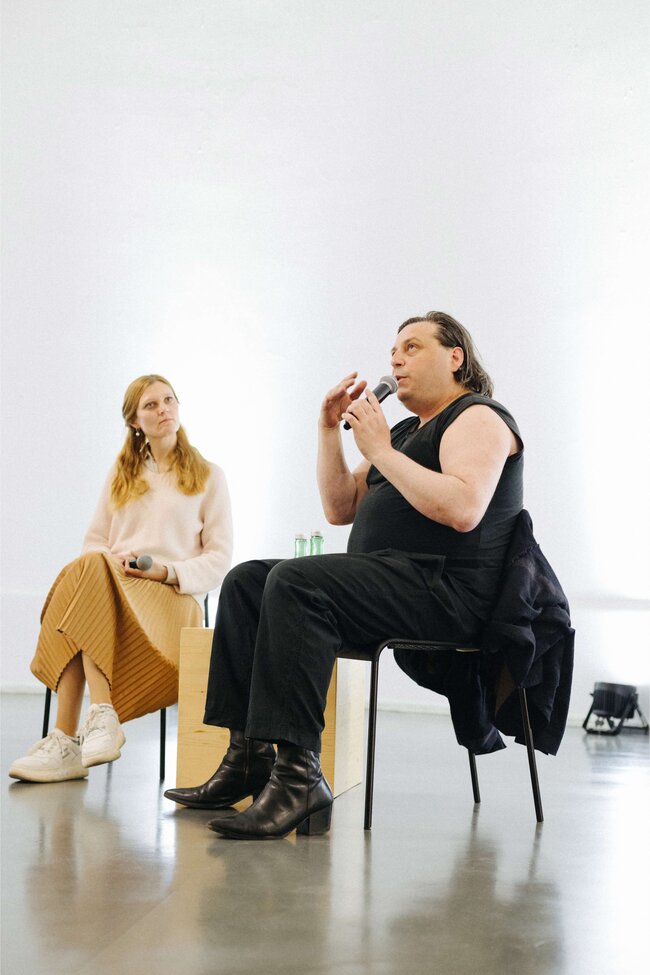
Gabriele Freitag: Ivan and Zhenia, would you like to comment on the question of red lines when it comes to freedom of speech?
Ivan Kolpakov: I think it’s a great question because it’s super uncomfortable.
I don’t want to justify censorship in any sense. As a journalist, I have an allergic reaction to any sort of regulation. I think the way you report can change in terms of our understanding of what is good or bad journalism, but I reject state regulation.
In an ideal, utopian situation, the media industry has a voice. It can express itself and say, “Well, this is acceptable — this is not very acceptable. This is a high standard — this is not a high standard.” Of course, it can be questioned. But the industry has to have a voice that allows it to confront both the state and society. It’s a very complicated institution, but at the same time, it’s very fragile and very vulnerable to any external regulations. We can see that.
We deal with a lot of criticism of our reporting, of the media, and of journalism in general, and I think that many critical notes are fair. However, I think that there is overwhelming collateral damage, and it’s killing us. We are losing independent journalism as a value and as an institution. We are losing this sense that independent journalism has to be independent and impartial, and must not be regulated from the outside. Because when it is regulated, you will lose it. So, for me, the red line is here.
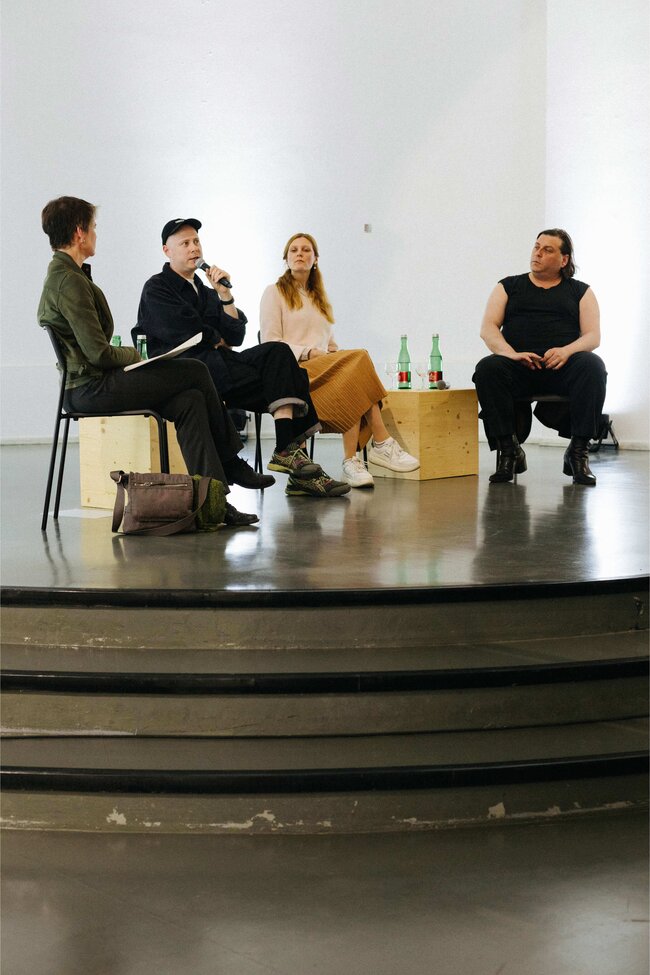
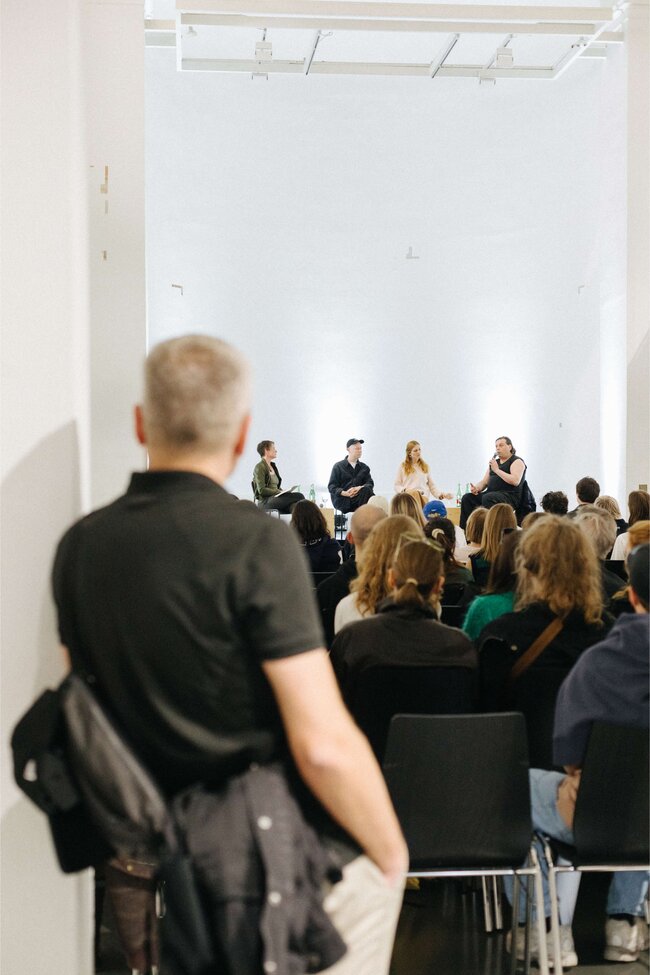
Zhenia Berezhna: I have a story about how censorship regulates society and society regulates itself, because I think that it can be a very powerful and very cruel thing.
My parents live here in Berlin with me, and two years ago, they wanted to take part in this charity event for Ukrainians. I wrote an application letter, and then I got a really rude answer from the head of the organization. Although this organization had on its flyers that they speak Russian, Ukrainian, English, and German, she told me, “We don’t want Russian-speaking people here. We have traumatized Ukrainians here, so never write here again. We will not take you.” This was the first time I faced this kind of response (it was before I wrote my book), and I was so shocked, I cried for hours because I couldn’t accept it.
I never told my parents, so they still don’t know what happened. I just said: “It was fully booked, so you can’t take part.” My father speaks more Russian, but my mom is Ukrainian-speaking. They lost their house, it was bombed, and they’re also refugees. I just could not find the words to explain the situation to them and to myself. And this is another form of censorship. I find this really dangerous and cruel, and it shouldn’t be like this. People should be more aware of what they’re saying.
On censorship
Gabriele Freitag: Ivan, since the beginning of Russia’s full-scale war against Ukraine, Meduza has had its own unspoken policy of self-censorship. Namely, if I understand you correctly, as journalists from Russia, you don’t talk and write about the hardships of your work while people inside and outside Ukraine suffer from the consequences of Russia’s war against them. What made Meduza change this policy and publicly reflect on its own work in this exhibition?
Ivan Kolpakov: I wouldn’t say that there was a real policy. However, there is a standard in our code that we try never to place ourselves at the center of our reporting. Of course, especially after 2022, you feel that you shouldn’t be at the center of the story. This isn’t about you, many other people are suffering more than we are, so it’s just another important thing to keep in mind.
But I also think that our experience can be used as a model to explain what’s going on within our community, because there are a lot of Russians in exile. There are a lot of institutions launched by Russians in exile, and many of them are collapsing financially or psychologically because life in exile is an extreme experience. When you realize that this whole community is collapsing, your instinctive journalistic response is to document it. So we’re trying to capture that moment.
It’s not a good moment. This isn’t an exhibition that we organized because we have a lot of free time, or just because we wanted to try something new. Above all, it’s a scream of desperation.
‘No’: Meduza’s new art exhibition in Berlin. From April 26 to July 6, the Kunstraum Kreuzberg/Bethanien gallery in Berlin will host “No,” an exhibition curated and organized by Meduza’s newsroom. This project brings together artists and journalists to reflect on the events of the past decade and explore why the world has become so fractured. The exhibition shares the stories of ordinary people caught in unbearable situations yet determined to remain true to themselves — hence its title. “No” stands as a symbol of resistance and a tribute to those who, against all odds, continue to say “no.” Share this event!
CAN’T MAKE IT TO BERLIN? WE’VE GOT YOU COVERED.
64 episodes



